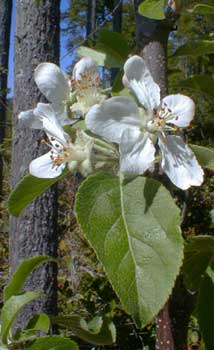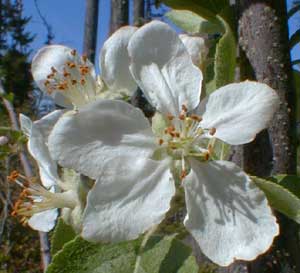
'Fuji' Apple
"Come, let us plant the apple-tree.
Cleave the tough greensward with the spade;
Wide let its hollow bed be made;
There gently lay the roots, & there
Sift the dark mould with kindly care,
And press it o'er them tenderly,
As, round the sleeping infant's feet,
We softly fold the cradle sheet;
So plant we the apple-tree."
-William Cullen Bryant
(1794-1878)
(1794-1878)
Malus pumila 'Fuji' (aka M. domestica 'Fuji') is a late-season fruiting apple. In our friends' garden it is the cross-pollinating companion of 'Granny Smith' on the sunrise-side of the Fuji.
Although 'Fuji' is semi-self-fertile & will fruit even if grown without a companion, it fruits much better with a cross-pollinator nearby. Both of these apples are popular in the Pacific Northwest as back-yard apples, as well as for commercial orchards.
But being late to ripen, both of these apples, & others such as 'Braeburn,' require a long temperate period to reach harvest ripeness, & are the wrong apples for regions with truncated seasons, where an early-season apple would be more appropriate.
 A grafted semi-dwarf sapling added to one's garden or orchard will take a few years to begin producing a lot of harvestable apples, but it is not at all unusual for 'Fuji' to produce a handful of apples even before mature & well-established.
A grafted semi-dwarf sapling added to one's garden or orchard will take a few years to begin producing a lot of harvestable apples, but it is not at all unusual for 'Fuji' to produce a handful of apples even before mature & well-established.As an ornamental tree, it is beautiful long before it is particularly fruitful, with glossy green foliage that takes on good colors in autumn, & scented pinkish-white April apple-blossoms such as are even the subject of romantic poetry & songs.
The variety dates to the 1950s & originated in Fujisaki, Japan, as a cross between 'Ralls Janet' & 'Red Delicious.' The town of Fujisaki is on a fertile farming plain where three rivers meet, where conditions are perfect for both apple & rice production.
The town was founded in the Heian Period, when the Ando Clan was established & Fujisaki Castle was built. It prospered due to the political might of Ando samurai & even more because of the successes of peasant farmers, whose rice was the region's true source of wealth.
Modern Fujisaki remains farm-oriented, & at apple blossom time the white clouds of flowers are celebrated by a spring festival with fireworks displays lighting the orchards at night.
It is a red & yellow apple almost perfectly round, & if used for baked apple recipes, it holds its shape even when cooked rather than sinking into a mush-pile.
'Fuji' soon became the standard apple of Japan & China, then began making strong inroads elsewhere in the world. It has only been in cultivation in the Pacific Northwest since the 1980s, yet it is today one of the top commercial apples grown here in Washington state.
In the foothills of the Cascade Mountains, the majority of Washington's orchards are small & family owned. As farming has become increasingly difficult to turn major profits for anyone but the mortgage bankers, many families which had grown apples for generations have in the present generation sold out, often to the immigrant farmworkers who had learned to live on seasonally shitty wages & were less inclined to scoff at the degree of profits feasible for a hardworking owner.
These farmworkers cum owners, many of them originally from Mexico, have become the backbone that keeps small orchards from vanishing the way the midwest's wheat & corn belt family farms vanished in favor of gigantic agribusinesses.
It has been estimated that in the history of apple cultivation, ten-thousand cultivars have been developed, the majority having fallen by the wayside with time. There are at present about one-hundred significant varieties of fruiting apples. Amidst all that competition, 'Fuji' has been steadily rising through the list of top-ten popular apples.
The Fuji is "sweet-tart" or "sweet but tartly spicy," & if properly fresh, quite crunchy, with creamy white flesh. It is good for eating, even better for cooking, & makes the best possible apple juice. It is also fabulous for dried apples; the slices become sweeter when dehydrated.
Harvested in late September or October, if correctly stored right on the cusp of freezing weather, Fujis will hold their unique sweet-tart flavor for five or six months of sales; Fujis stored longer than that will have fallen off in flavor & texture.